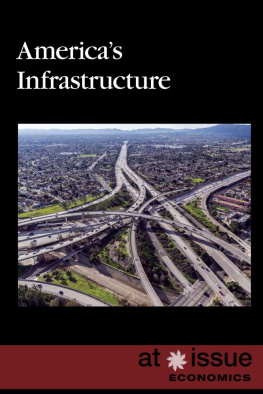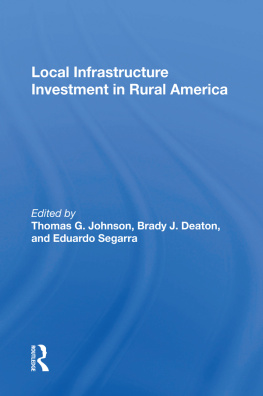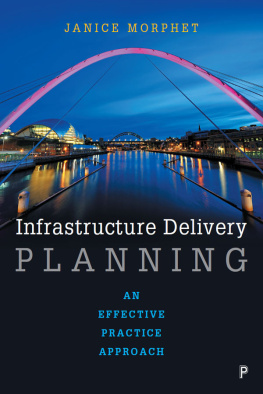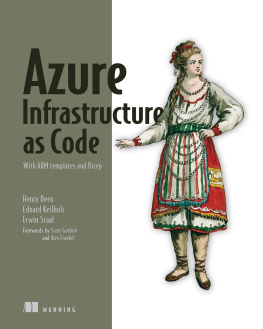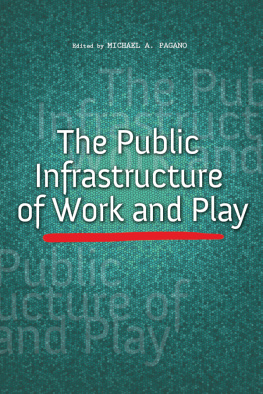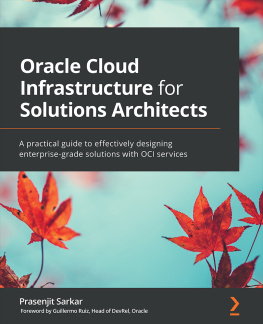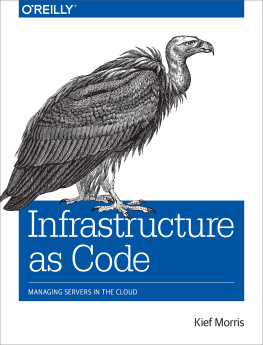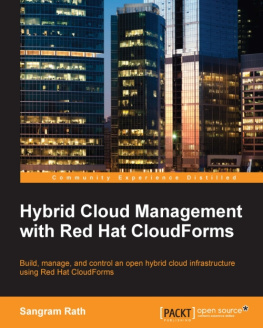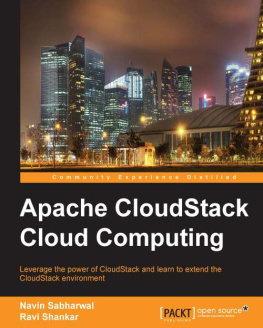INFRASTRUCTURE
More Praise for Infrastructure
Read Infrastructure and you will never see the world quite the same again.
TIM WU, Professor of Law, Columbia Law School (Concurring Opinions)
The student of infrastructure policy will benefit from Frischmanns excellent treatment of public goods and social goods; spillovers and externalities; proprietary versus commons systems management; common carriage policies and open access regulation; congestion pricing strategies; and the debate over price discrimination for infrastructural resources. Infrastructure deserves a spot on your shelf whether you are just beginning your investigation of these issues or if you have covered them your entire life.
ADAM THIERER, Senior Research Fellow, The Mercatus Center at George Mason University (Concurring Opinions)
Brett Frischmanns excellent new book has crafted an elaborate theory of infrastructure that creates an intellectual foundation for addressing some of the most critical policy issues of our time: transportation, communication, environmental protection and beyond.
LAURA DENARDIS, Associate Professor, School of Communication at American University (Concurring Opinions)
Frischmanns book is an important contribution across a wide range of fields. It is a terrific achievement and I think its influence will continue to grow as we grapple with the implications of its analysis.
MICHAEL BURSTEIN, Cardozo School of Law, PatentlyO.com
Its unlikely that we are ever going to get a book as rigorous and comprehensive in its treatment of infrastructure as a commons than Professor Brett Frischmanns recently published Infrastructure: The Social Value of Shared Resources (Oxford University Press). This book is a landmark in the study of the social value of infrastructure, a theme that is generally overlooked or marginalized.
DAVID BOLLIER, Bollier.org
The book provides a new and productive way of analyzing all forms of infrastructure, especially those that are sources of major social value. Frischmann helps us recognize the importance of understanding how different types of policies balance provision and use. With its many fresh ideas, Infrastructure itself is likely to generate social value through additional research and the creation of innovative policies.
EDELLA SCHLAGER, Science (July 13, 2012)
A well-motivated, fundamental call for action. I hope that subsequent work will integrate the ideas developed in this book for the purpose of cost-benefit analysis and policy decisions on governance and market structure Professor Frischmann has put the spotlight on the demand side. It is my hope and wish that his book will lead to more comprehensive debates and policy decisions.
PAUL W.J. DE BIJL, Department of Competition and Regulation, CPB Netherlands Bureau for Economic Policy Analysis, Journal of Information Policy (2012)
Infrastructure
THE SOCIAL VALUE OF SHARED RESOURCES
Brett M. Frischmann


Oxford University Press is a department of the University of Oxford.
It furthers the Universitys objective of excellence in research, scholarship, and education by publishing worldwide.
Oxford New York
Auckland Cape Town Dar es Salaam Hong Kong Karachi
Kuala Lumpur Madrid Melbourne Mexico City Nairobi
New Delhi Shanghai Taipei Toronto
With offices in
Argentina Austria Brazil Chile Czech Republic France Greece
Guatemala Hungary Italy Japan Poland Portugal Singapore
South Korea Switzerland Thailand Turkey Ukraine Vietnam
Oxford is a registered trade mark of Oxford University Press in the UK and certain other countries.
Published in the United States of America by
Oxford University Press
198 Madison Avenue, New York, NY 10016
Brett M. Frischmann 2012
All rights reserved. No part of this publication may be reproduced, stored in a retrieval system, or transmitted, in any form or by any means, without the prior permission in writing of Oxford University Press, or as expressly permitted by law, by license, or under terms agreed with the appropriate reproduction rights organization. Inquiries concerning reproduction outside the scope of the above should be sent to the Rights Department, Oxford University Press, at the address above.
You must not circulate this work in any other form
and you must impose this same condition on any acquirer.
First printing in paperback, 2013
ISBN 978-0-19-997550-1 (paperback : alk. paper)
Library of Congress Cataloging-in-Publication Data
Frischmann, Brett M.
Infrastructure : the social value of shared resources / Brett M. Frischmann.
p. cm.
Includes bibliographical references and index.
ISBN 978-0-19-989565-6 (hbk. : alk. paper)
1. Infrastructure (Economics)Social aspects. I. Title.
HC79.C3F75 2012
363dc23
2011040968
Printed in the United States of America on acid-free paper
Note to Readers
This publication is designed to provide accurate and authoritative information in regard to the subject matter covered. It is based upon sources believed to be accurate and reliable and is intended to be current as of the time it was written. It is sold with the understanding that the publisher is not engaged in rendering legal, accounting, or other professional services. If legal advice or other expert assistance is required, the services of a competent professional person should be sought. Also, to confirm that the information has not been affected or changed by recent developments, traditional legal research techniques should be used, including checking primary sources where appropriate.
(Based on the Declaration of Principles jointly adopted by a Committee of the
American Bar Association and a Committee of Publishers and Associations.)
You may order this or any other Oxford University Press publication
by visiting the Oxford University Press website at www.oup.com.
To my wife, Kelly, and my three boys, Matthew, Jake, and Ben
Contents
This book devotes much-needed attention to understanding how society benefits from infrastructure resources and how management decisions affect a wide variety of interests. This book links infrastructure, a particular set of resources defined in terms of the manner in which they create value, with commons, a resource management principle by which a resource is shared within a community.
Too often, we take for granted the shared infrastructures that shape our lives, our relationships with each other, the opportunities we enjoy, and the environment we share. Think for a moment about the basic supporting infrastructures that you rely on daily. Some obvious examples are roads, the Internet, water systems, and the electric power grid, to name just a few. In fact, there are many less obvious examples, such as our shared language, legal institutions, ideas, and even the atmosphere. We depend heavily on shared infrastructures, yet it is difficult to appreciate just how much. It is difficult to fully appreciate how these resources contribute to our lives, because infrastructures are complex and the benefits provided are typically indirect. We dont pay much attention to infrastructure resources, because they are conveniently obscure, part of the background. We assume their continuous availability and pay attention to them only when catastrophe strikes, for example when a bridge fails or rolling blackouts deprive us of the electricity we need. And even then, the public attention given is reactive, isolated, and short-lived.
Next page

